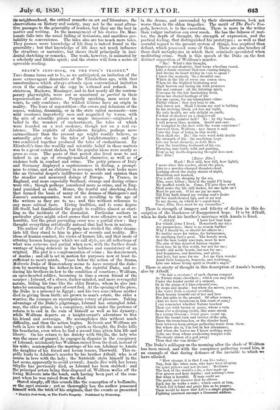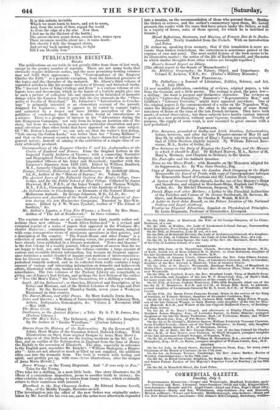DEATH'S JEST-BOOK, OR THE FOOL'S TRAGEDY...
THIS drama turns out to be, as we anticipated, an imitation of the more extravagant dramatists of the Elizabethan age, with that unnaturalness which always attends upon conventional imitation even if the outlines of the copy be softened and refined. In strictness, Marlowe, Me esinger, and in fact nearly all the contem- porary playwrights, were not so unnatural as partial in their representations of nature. Properly speaking, man never in- vents, he only combines ; the wildest fictions have an origin in reality. The fears of superstition—the errors and delusions of the senses, waking, dreaming, or in the state called mesmeric—rare wild creatures imperfectly seen and magnified by terror, with the arts of scientific priests or magic impostors—originated a belief in the wonders of enchantment, the -tales of which were founded on a real credence' though not on a real ex- istence. The exploits of chivalrous knights, perhaps more extraordinary than the present age might readily believe, as naturally gave rise to the tales of k-nighterrantry ; and the two combined together produced the tales of enchantment. l3y Flieabeth's time the worldly and scientific belief in those matters was to a great extent shaken, but the popular ideas were nearly as gross as ever. The poets of that period also lived near to and indeed in an age of strongly-marked character, as well as of violence both in conduct and crime. The petty princes of Italy and Germany displayed a capriciousness in feeling, a prompt- ness to crime, and. an obduracy in revenge, which now looks more like an Oriental despot's indifference to morals and opinion than the steadier and measured doings of Europe. In France, in England, and more especially Scotland, strange and daring crimes were rife thoughperhaps considered more as crime, and in Eng- land punished as such. Hence, the fearful and shocking deeds that formed the basis of many of the dramas of Sludispere's and J-onson's contemporaries, were not so revolting to the age of the writers as they are to us-; and this without reference to any more critical taste. Living tradition and to some degree life- itself, had familiarized the people to realities almost as start- ling as the incidents of the dramatist. Particular authors in particular plays might select scenes that were offensive as well as horrible, but the great pervading error was a partial view : they thought everything artistically natural that had been in nature. The author of The Fool's Tragedy has studied the older drama- tists till they stand to him in place of records and reality. His ideas of human conduct, his views of human life, and that mode of uttering human langnege which-we call style, are all reflections of what was extreme and partial when new, with the further disad- vantage of being deficient in the boldness and consistency of an original. His:, plot is a conglomeration of crime ; his denouement, of deaths ; a all is set in motion for purposes now at least in- sufficient to men's minds. Years before the action of the drama, Melveric Duke of Munstenberg seems to have usurped the duke- dom by murdering his father-in-law, the rightful Duke, and re- ducing his brothers-in-law to the condition of courtiers ; Wolfram, an open-hearted soldier, becoming in time a sworn friend of the usurper ; Isbrand, of a closer, darker-minded, and more revengeful nature, biding his time like the elder Brutus, whom he also imi- tates by assuming the part of court fool. At the opening of the piece, the Duke is a prisoner in Egypt ; and his two sons( whose mother died in giving them birth) are grown to man's estate, the elder a warrior, the younger an unscrupulous votary of pleasure. Taking advantage of the Duke's pilgrimage, Isbrand has entangled Adel- mar, the elder prince, in a conspiracy, which. under the pretence of reform is to end, in the ruin of himself as well as his dynasty; while Wolfram departs on a knight-errant's adventure to free his friend and sovereign. Be accomplishes this without much difficulty, and then the action begins. Melveric and Wolfram are both in love with the same lady; quick as thought, the Duke kills his benefactor, even when he had a second time given him life and liberty. On his return to his dutchy with Sibylla, the lady who was the cause of quarrel, he engages in disguise in the conspiracy of Isbrand; mistakenly has Wolfram raised from the dead, instead of his wife; contemplates the marriage of his son .Arlalmar to Arnala the daughter of his friend and locum tenens, Thorwrdd. This ra- pidly leads to Adalmar's murder by his brother Athulf, who is of come in love with the lady.; the fratricide stabs himself in the last scene, apparently M avoid avowal; Amnia dies with her lover; Sibylla has previously died, as Isbrand has been stabbed: and the. principal actors being thus disposed Wolfram walks off the
Melveric into the tomb, such having been part of the com- pact when he was raised from the dead.
Stated simply, all this sounds like the conception of a bedlamite, or the cogri somnia ; yet so thoroughly has the author possessed himself with the trick of his originals, that the events as presented • Death's .Test-hook, or The Fool's Tragedy. Published by Pickering. in the drama, and surrounded by their circumstances, look not worse than in the olden tragedies. The merit of The Fool's Tra- gedy, however, is in the execution. Them is more in the writer than vulgar imitation can ever reach., Be has the fulness of mat- ter, the depth of thought the strength of expression and the poetical feeling, that distinguished his prototypes ; as well as that scornful regard to the present system of things, less sceptical than defiant, which possessed some of them. There are also touches of those dark metaphysics in which their criminals speculated when meditating crime. Such is this speech of the Duke on the fast distinct suggestion of Wolfram's murder. "Ha! What's this thought,
Shapeless and shadowy, that keeps wheeling round, Lace a dumb creature that sees coming danger, And breaks its heart trying in vain to speak? I know the moment, 'tis a dreadful one, Which in the life of every one comes once, When for the flighted hesitating soul High heaven and luring sin with promises Bid and contend : oft the faltering spirit, O'ercome by the fair fascinating fiend, Gives her eternal heritage of life For one caress, for one triumphant crime. Pitiful villain ! that dost long to sin, And darest not. Shall I dream my soul is bathing In his reviving. blood, yet lose my right, My only health, my sole delight on earth, For fear of shadows on a chapel-wall In some pale painted hell ? No: by thy beauty, I will possess thee, maiden. Doubt and care Be trampled in the dust with the worm conscience ! Farewell then, Wolfram : now Amen is said Unto thy time of being in this world ; Thou shalt die. Ha! the very word cloth double My strength of life : the resolution leaps Into ray heart divinely, as doth Mars Upon the trembling footboard of his car, Hurrying into battle wild and panting, Even as my death-dispensing thought does now. Ho ! Ziba ! [Enter Elba.] Hush ! How still, how full, how lightly I move since this resolve, about the place, Like to a murder-charged thunder-cloud Lurking about the starry streets of night, Breathless and masked, O'er a still city sleeping by the sea.
Ziba, come hither ; thou'rt the night ru hang My muftled wrath in. Come, ru give thee work
Shall make thy life still darker, for one light on't ?dust be put out. 01st me joy no more, Till Fate bath kissed my wooing soul's desire Off her death-honied lips, and so set seal
To my decree, in which he's sepulchred.
Come, Ziba, thou must be my counsellor."
There is strength of imagery and felicity of diction in this de- scription of the blankness of disappointed hope. It is by Athulf, when, he finds that his brother's marriage -with .Amala is fixed. For Vfa I have lost that hope hdiitlltdone I lived. Henceforth my days Are purposeless ; there is no reason further Why I should be, or should let others be ; No motive more for virtue, for forbearance, Or anything that's good. The hourly need, And the base bodily cravings, must be now The aim of this deserted human engine. Good may be in this world, but not for me ; Gentle and noble hearts, but not for me ; And happiness, and heroism, and glory, And love, but none for me Let me then wander Amid their banquets, funerals, and weddings, Like one whose living spirit is Death's angel."
There is nicety of thought in this description of Amala's beauty, also by Athulf.
"So fair a creature ! of such charms compact
As Nature stints elsewhere ; which you may find Under the tender eyelid of a serpent, Or in the gorge of a kiss-coloured rose, By drops and sparks : but when she moves, you see, Like water from a crystal overfilled, Fresh beauty tremble out of her and lave Her fair sides to the ground. Of other women, - And we have beauteous in this court of ours,) I can remember whether Nature touched Their eye with brown or azure, where a vein Buns o'er a sleeping eyelid, like some streak In a young, blossom ; every grace count up, Here the round turn and crevice of the arm, There the tress-bunches, or the slender hand Seen between harp-strings gathering music from them: But where she is, I'm lost in her abundance,
And when she leaves me I know nothing more
aale one from whose awakening temples rolls The cloudy vision of a god away) Than that she was divine."
The Duke's soliloquy on the morning after the shade of Wolfram has been raised, and with the conspiracy gathering round him, is an example of that daring defiance of the invisible to which we have alluded.
"How strange it is that I can live today ; Nay, look like other men, who have been sleeping . On quiet pillows and not dreamt ! Methinks The Ilook of the world's a lie, a face made up O'er graves and fiery depths ; and nothing's true But what is horrible. If man could see The perils and diseases that he elbows Hach. day he walka a mile ; which catch at him, Which fall behind and graze him as he passes.; Then would he know that Life's a single pilgrim, Fighting unarmed amongst a thousand soldiers.
It is this infinite invisible Which we must learn to know, and yet to scorn, And, from the scorn of that, regard the world As from the edge of a far star. Now then I feel me in the thickest of the battle; The arrow-shower pours down, swords hew, mines open Their ravenous mouths about me ; it rains death : But cheerly I defy the braggart storm
And set my back against a rock, to fight
Till I am bloodily won." -



























 Previous page
Previous page